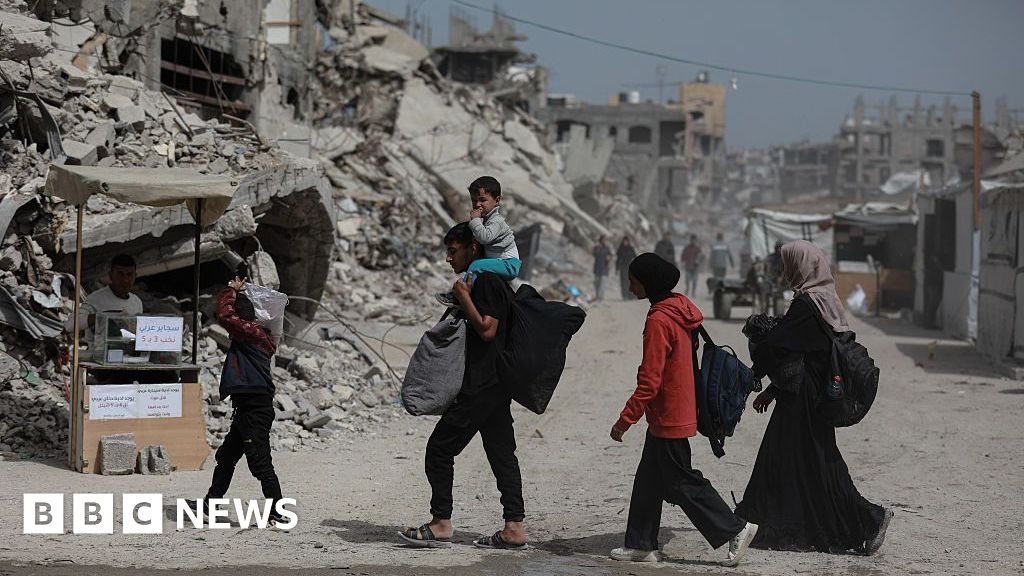Israeli forces have besieged a hospital in northern Gaza as they continue an offensive to seize territory in the Strip, the Hamas-run health ministry has said.
Medical staff and patients at the Indonesian Hospital, in Beit Lahia, came under “heavy fire… preventing the arrival of patients, medical staff, and supplies”, the ministry said on Sunday.
Israel’s military said it had launched “extensive ground operations” over the past day as part of a new offensive aimed at destroying Hamas which it has called “Operation Gideon’s Chariots”.
This week has also seen the deadliest wave of air strikes on Gaza in months.
The Israel Defense Forces (IDF) said it troops were fighting “terrorist infrastructure sites” in northern Gaza, including the area near to the Indonesian hospital.
The health ministry said three public hospitals were now “out of action” in the North Gaza governorate. At least 67 people have died and 361 have been injured in the last 24 hours, it said.
Speaking to the BBC on Sunday, Mohammed Salha, director of the al-Awda private hospital in northern Gaza, said the closure of the Indonesian Hospital would have an impact on the care he was able to provide.
He said al-Awda depended on the Indonesian Hospital for stores of oxygen and for its intensive care unit.
Mr Salha added that there had been a bombing near his hospital overnight causing “a lot of damage” to the facility that staff were attempting to quickly repair.
On Tuesday, Israeli strikes had hit two of the largest hospitals in Khan Younis, the Nasser Medical Complex and European Hospital.
The Israeli military accused Hamas of hiding a command and control centre beneath European Hospital, and said it conducted a “precise strike” on “Hamas terrorists”.
Israeli media reported the target of the strike was senior Hamas figure Mohammed Sinwar – the younger brother of the former Hamas leader in Gaza, Yahya Sinwar.
Israeli strikes on Saturday hit the southern city of Khan Younis again, as well as towns in the north of Gaza, including Beit Lahia and the Jabalia refugee camp, the health ministry and rescuers from the civil defence forces said.
Thousands of people have been killed since Israel resumed its strikes on 18 March, following the collapse of a fragile ceasefire which lasted two months.
Israel’s military has said the expansion of its campaign is aimed at “achieving all the war’s objectives” including releasing hostages and “the defeat of Hamas”.
Aid agencies have warned about the risk of famine among Gaza’s 2.1 million population, as footage and accounts emerge of emaciated children suffering malnutrition. Israel has been blocking supplies of food and other aid from entering the territory for 10 weeks.
New indirect talks aimed at securing a ceasefire were held on Saturday in Qatar, just hours after Israel launched its major new offensive.
Hamas offered to release nine hostages in exchange for a 60-day truce, a Palestinian official told the BBC.
The official said the new proposed deal would also allow the entry of 400 aid trucks a day, and the evacuation of medical patients from Gaza. Israel, in turn, has demanded proof of life and detailed information about all remaining hostages.
Israel said prior to the talks that it would not withdraw troops from Gaza or commit to an end to the war.
Prime Minister Benjamin Netanyahu earlier this month promised a major military escalation in the war to occupy and control swathes of Gaza, force the Palestinian population to the south of the territory, and “destroy” Hamas.
The war was triggered by the Hamas-led attacks on southern Israel on 7 October 2023, which saw about 1,200 people killed and more than 250 taken hostage.
Some 58 hostages remain in Gaza, up to 23 of whom are believed to be alive.
More than 53,000 Palestinians have been killed during Israel’s military campaign in Gaza.
Source: www.bbc.com
